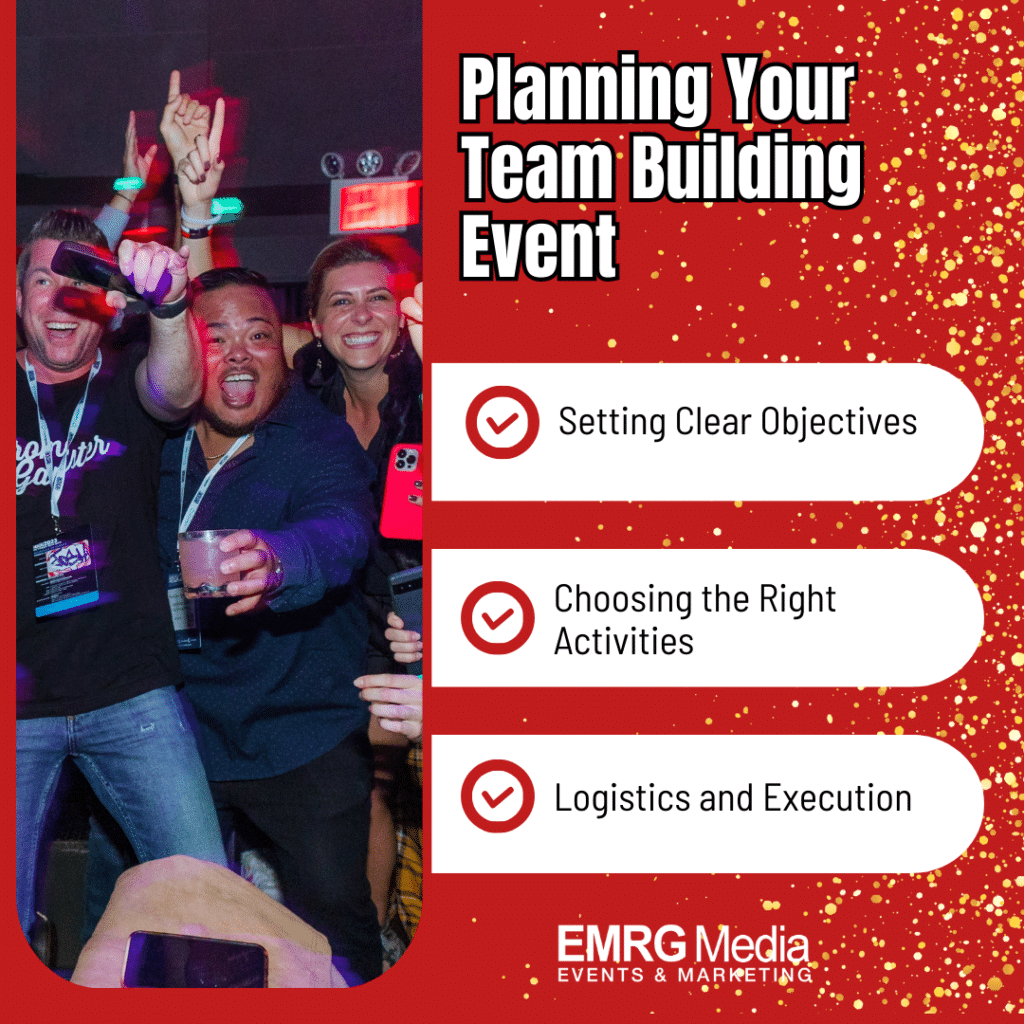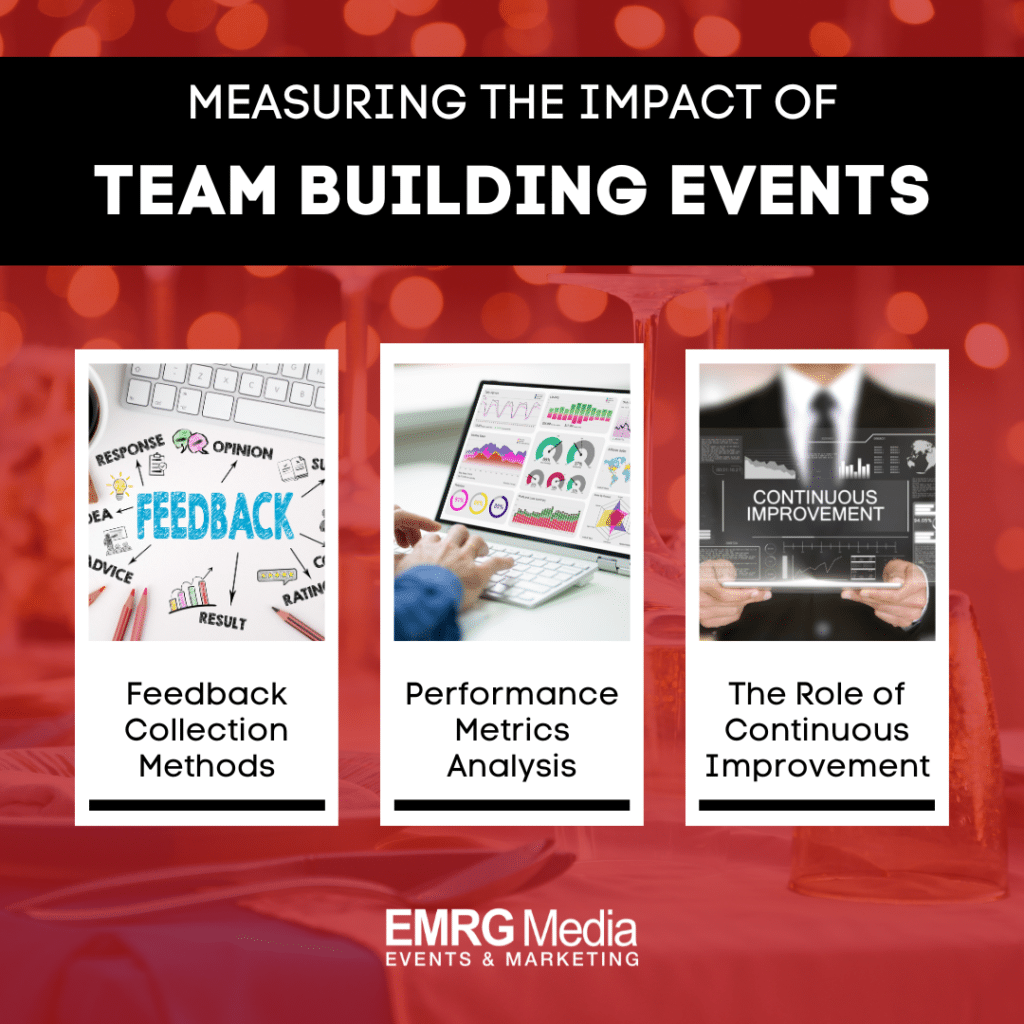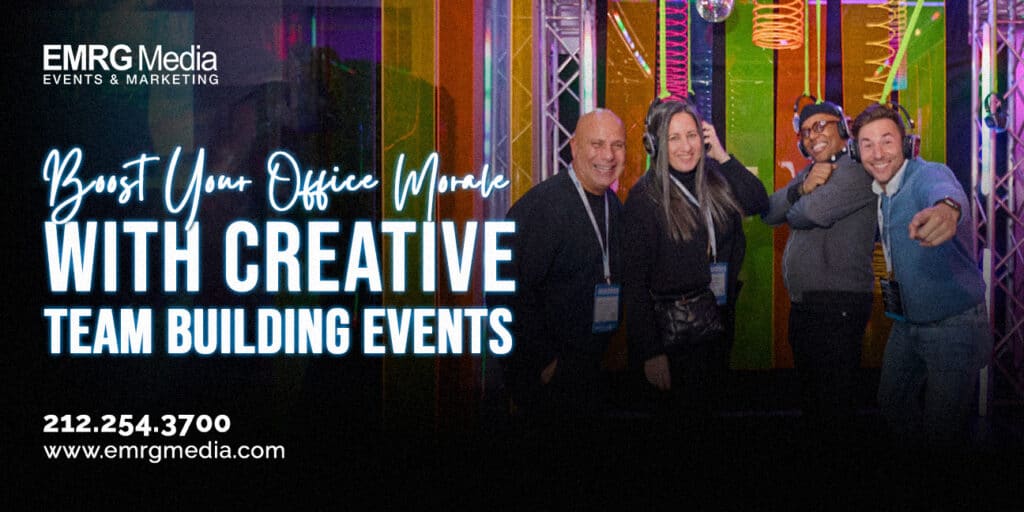Team building events are pivotal in cultivating collaboration, enhancing communication, and fostering a vibrant work culture.
These events transcend simple social outings, acting as strategic tools to strengthen relationships among team members, spark creativity, and address challenges in a collaborative spirit.
This article provides a comprehensive guide to orchestrating successful team building events, starting from the initial planning stages of setting clear objectives to the final steps of evaluating their effectiveness.
You’ll embark on a journey to discover activities that align with your goals and learn about the critical role of skilled facilitators in encouraging active participation from all team members.
We’ll explore cutting-edge trends that are redefining team building’s future and address common challenges head-on, ensuring that your team building endeavor is not only enjoyable but also profoundly impactful for every participant.
Ready to turn your event vision into a reality? Contact EMRG Media and let our team of experts guide you through a seamless and unforgettable event planning experience in New York City.
Table Of Contents:
- The Essence of Team Building Events
- Popular Types of Team Building Activities
- Planning Your Team Building Event
- The Role of Facilitators in Team Building
- Measuring the Impact of Team Building Events
- Innovative Team Building Trends to Watch
- Navigating Challenges in Team Building Events
- FAQs about Team Building Events
- Elevating Office Morale Through Impactful Team Building Events
The Essence of Team Building Events
Team building events are more than just a day out of the office. These gatherings are a deposit into your team’s tomorrow, aiming to solidify relationships, enhance dialogue, and encourage teamwork.
Let’s break down why they’re so crucial.
Boosting Collaboration and Communication
Fundamentally, team-building exercises establish a foundation where workers can interact and bond over more than just their professional duties.
This is essential because solid relationships among team members can significantly enhance productivity and job satisfaction.
For instance, activities that require problem-solving or creative thinking encourage participants to discuss ideas openly, listen actively, and value different perspectives.
In today’s fast-paced work environment, where remote working has become increasingly common, fostering a sense of belonging and understanding through virtual or physical team-building exercises is critical for maintaining cohesive teams.
Promoting a Positive Work Culture
A positive workplace culture doesn’t happen by accident; it needs nurturing. Team building events play a pivotal role here by breaking down barriers between hierarchical levels within an organization.
When employees from various departments come together in a non-work-related setting, the lines between positions blur, promoting equality and inclusivity, a foundation for innovation.
This shared experience becomes part of your company’s narrative. It values its people as much as its results, making it an attractive place for current employees and appealing to potential new hires looking for environments where teamwork is celebrated.
Fostering Innovation Through Creativity
Lastly, creativity flourishes when minds meet outside conventional work settings.
Google also found this: its most successful teams were those free to explore ideas without fearing failure during collaborative projects, such as hackathons or brainstorming sessions at retreats.
In this space, where collaboration thrives beyond traditional boundaries, the seeds of revolutionary concepts and answers are sown.
Embracing this approach is pivotal for maintaining our edge in a competitive landscape, merging varied skills and viewpoints that may not ordinarily converge.
Popular Types of Team Building Activities
Creative Challenges: Unleashing Innovation
Engaging in creative team building games like the Egg Drop Challenge encourages team members to harness their innovative skills and work collaboratively under pressure.
Participants are divided into small groups and tasked with constructing a device to protect an egg from breaking when dropped from a significant height.
This activity sparks creativity and fosters problem-solving skills, as teams must brainstorm, design, and test their prototypes using limited materials.
It highlights the importance of iterative testing and adaptation, mirroring real-world project management scenarios where teams navigate constraints to achieve their goals.
Puzzle Solving and Mystery Games: Enhancing Teamwork and Critical Thinking
Murder Mystery games and Scavenger Hunts are thrilling ways to build teamwork and enhance critical thinking skills within a group.
In a Murder Mystery game, team members assume different roles within a story where they must work together to uncover clues, solve puzzles, and deduce the identity of the ‘murderer’ among them.
This activity requires communication, collaboration, and analytical skills, as each member brings their unique perspective to solve the mystery.
Similarly, Scavenger Hunts get teams to work together in a race against time, searching for specific items or solving riddles that lead them to various locations.
These activities break the monotony of the daily work routine and improve team dynamics as participants learn to trust and rely on each other’s abilities.
Communication and Trust Building Exercises: Strengthening Interpersonal Bonds
Activities such as the Human Knot and Office Trivia are excellent for strengthening communication and trust among team members.
The Human Knot is a physical activity where participants stand in a circle, grab hands with two different people across the circle, and then attempt to untangle the knot without releasing their hands.
This exercise challenges teams to communicate effectively and work patiently with one another, highlighting the importance of giving and receiving support.
On the other hand, Office Trivia is a lighter, fun activity that can be tailored to include questions about the team members, the company, or general knowledge.
It promotes a sense of belonging and unity as teams cheer each other on and enjoy a shared experience. Both activities reinforce the foundation of any strong team: trust and open communication.
Planning Your Team Building Event
Setting Clear Objectives: The Foundation of Success
Establishing clear objectives is essential for any team building activity, as it ensures that the event meets the specific needs of your team members.
Identifying these goals helps select activities that provide fun and contribute to strengthening the team bond.
Whether the focus is improving communication, boosting morale, or fostering creativity, clear objectives guide the planning process toward a successful outcome.
Choosing the Right Activities: Matching Team Needs with Fun
The right mix of activities is crucial for a fun team building event, catering to all team members’ diverse interests and strengths.
Activities like scavenger hunts and office trivia can engage participants in problem-solving and knowledge sharing, enhancing the team bond.
It’s essential to select inclusive activities that ensure everyone can participate, making the experience enjoyable and beneficial for the entire team.

Logistics and Execution: Ensuring a Smooth Experience
Efficient planning and execution of logistics are key to the smooth running of a team building activity, from selecting a venue to ensuring all materials are ready.
Clear communication about the event details helps team members prepare, creating anticipation for a fun and engaging experience. Involving the team in the organization process reinforces the team bond and ensures a memorable event for everyone.
The Role of Facilitators in Team Building
At the core of every successful team building event is a skilled facilitator. These individuals are not just coordinators but the glue that holds the event together, ensuring every activity aligns with the overall goals.
Why Skilled Facilitators Are Important
Skilled facilitators bring out the best in a team. They create a welcoming environment where everyone is encouraged to participate and share ideas, fostering inclusivity and open communication.
They are adept at adapting to the group’s changing dynamics, smoothly managing unforeseen challenges while keeping the event engaging and on track.
Additionally, they are crucial in the debriefing phase, where they help translate the lessons learned into actionable insights for the workplace, ensuring the event’s benefits extend beyond the day.
Choosing the Right Facilitator
Selecting the right facilitator is key to a successful team building event. Look for someone with the right mix of experience, industry knowledge, and a personality that meshes well with your team.
This careful selection ensures your facilitator can connect with participants effectively, creating a foundation for a transformative team building experience.
Measuring the Impact of Team Building Events
Feedback Collection Methods
Collecting responses is pivotal in grasping how practical team bonding activities are. This can be done through surveys, one-on-one interviews, or group discussions immediately following the event.

These approaches allow attendees to voice their reflections and propose enhancements for forthcoming gatherings.
To get more specific insights, asking about particular aspects such as engagement level, relevance to job roles, and overall satisfaction with the event is beneficial.
Performance Metrics Analysis
Beyond subjective feedback, measuring changes in performance metrics pre-event and post-event can provide objective evidence of impact.
Look at crucial indicators relevant to your goals, including teamwork efficiency, project completion rates, or employee turnover statistics.
Analyzing these metrics requires access to data before and after team building activities.
Tools like Google Analytics can help track website collaboration on projects if digital performance is a focus area, while HR software may assist in monitoring changes in staff retention rates.
The Role of Continuous Improvement
Embracing the notion that perfection is an endless pursuit, we can refine and elevate the impact of subsequent endeavors.
Use collected feedback and analyzed data as an assessment tool and a roadmap for enhancing upcoming team-building initiatives.
Embracing fresh insights from team feedback breathes new life into each gathering, making them more tailored and beneficial for everyone involved, thus nurturing an ever-evolving environment of progress and innovation in your company.
Innovative Team Building Trends to Watch
Embracing Technology in Team Building
Incorporating technology into group exercises is a pivotal transformation in fostering team unity, radically altering how members interact and bond.
This trend makes events more engaging and accessible for remote teams. Virtual reality (VR) experiences, for example, are on the rise, offering teams immersive ways to connect and solve problems together without being in the same room.
Introducing game-like elements into the workflow is rapidly becoming a favored technique. By turning tasks into competitive games with rewards, companies can boost employee motivation and productivity.
Apps facilitating real-time feedback during these activities further enhance communication skills and collaboration.
Focusing on Mental Health
In the modern workplace, prioritizing mental wellness shapes how companies cultivate team cohesion. Activities now often include elements designed to reduce stress and improve well-being among participants.
Nowadays, you’ll find that teams are engaging in activities like meditation gatherings, emotional development workshops, and programs to strengthen mental toughness as part of this evolving focus.
This evolution underscores the understanding that a robust team transcends mere physical availability or expertise, embracing the nurturing of mutual psychological well-being. Such initiatives foster an inclusive culture where everyone feels valued and understood.
Customized Experiences Over One-Size-Fits-All
The trend is shifting from one-size-fits-all team bonding activities to bespoke events that mirror a firm’s distinct ethos and principles.
Forbes states that successful events now rely on customization, adapting activities to meet specific goals while appealing to participants’ interests.
This bespoke approach ensures higher engagement levels as employees feel directly connected with the activity’s content, Inc Magazine notes, ultimately leading to better outcomes for individuals involved and overall business performance.
Navigating Challenges in Team Building Events
Organizing team building events involves overcoming several challenges to create a cohesive and engaged team atmosphere.
Managing schedules and selecting universally appealing activities can seem daunting, but they are essential steps in building a productive team environment.
Diverse Preferences and Interests
Accommodating the varied preferences and interests within a team is a significant challenge. A solution is to conduct pre-event surveys to understand what everyone enjoys and to plan events that cater to these diverse interests.
Incorporating a range of activities, from intellectual games to physical challenges, ensures there’s something for every team member, making the event more inclusive and engaging.
Scheduling Conflicts
Finding a time slot suitable for every member is another common challenge, but it’s not impossible to overcome.
Leveraging digital tools such as Doodle polls allows teams to vote on preferred dates and times effortlessly, thus simplifying the scheduling process.
To further mitigate this issue, consider organizing smaller group sessions or offering multiple date options for larger events. This flexibility lets everyone participate at their convenience without feeling left out.
Measuring Success Post-Event
Evaluating the effectiveness of a team building event is crucial for understanding its impact and planning future activities.
Collecting feedback through post-event surveys or discussions provides valuable insights into the event’s successes and areas for improvement.
Tools like SurveyMonkey simplify this process by providing customizable questionnaires tailored specifically towards evaluating corporate events’ effectiveness.
FAQs about Team Building Events
What are great team building events?
Escape rooms, cooking challenges, and outdoor adventures top the list. They push teams to collaborate creatively under pressure.
What are the 4 main types of team building activities?
The big four: communication exercises, problem-solving tasks, trust-building activities, and adaptability challenges keep teams sharp.
What are the 5 C’s of team building?
The five Cs stand for communication, collaboration, commitment, creativity, and critical thinking—key ingredients for stellar teamwork.
What are the 4 C’s of team building?
The four core elements, Communication, Cooperation, Confidence Building, and Conflict Resolution, form a solid foundation for effective teams.
Elevating Office Morale Through Impactful Team Building Events
Organizing team building events can open up pathways for teamwork, ignite innovative thinking, and elevate the spirits of everyone involved. They’re the key to a vibrant work culture.
From planning to execution, every step matters. Set clear goals, choose activities wisely, and don’t forget the power of skilled facilitators.
Innovation in team building is on the rise. Lean into the latest movements emphasizing tech advancements and psychological well-being to amplify your results significantly.
Challenges will arise, but facing them head-on ensures your event strengthens bonds and leaves lasting memories.
Jumping wholeheartedly into team-building activities, armed with a genuine desire for improvement and adaptability, can fundamentally alter the interpersonal landscape of your workplace.
Let these experiences be a cornerstone for growth and unity within your team.
Embark on a journey of team building event planning with EMRG Media. Contact us today to start crafting your next extraordinary event in NYC.




